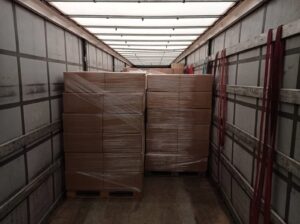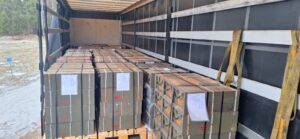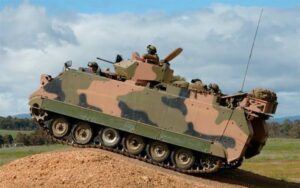
Finnish company Posiva Solutions has developed a concept for the construction of a deep disposal facility for the decommissioned Ignalina Nuclear Power Plant (INPP) in Lithuania, the plant said in a statement.
According to INPP Director General Linas Baužys, quoted in the statement, this is an important stage in the construction of deep burial facility.
“This month we started public consultations with municipalities. From now on, as we continue them, we will have an idea of how the future radioactive waste burial ground will physically look like and what specific measures will be taken to ensure its safety,” Baužis said.
The burial site will be several hundred meters deep. It will be an engineering structure designed to safely isolate radioactive waste. It is planned to be operational in 2068 and its location will be approved by 2047. The concept will be adjusted depending on the progress of the project development.
INPP signed a contract with a Finnish company for the amount of 262 thousand euros in January 2022. According to calculations made at that time, only the construction of of the burial ground will cost 1 billion euros, its use – another 900 million euros.
As reported, INPP was shut down on December 31, 2009, the term of work to stop its operation – until 2038. Lithuania pledged to close the plant upon joining the European Union, which co-finances these works.
The plant is equipped with the world’s most powerful Russian RBMK reactors, built in the 1980s. Work on dismantling the RBMKs is expected to start in 2028. INPP will issue separate tenders for this work.
Ignalina Nuclear Power Plant, LITHUANIA, Posiva Solutions, RADIOACTIVE WASTE

The blockade of a road on the Lithuanian-Polish border by farmers on March 1 may violate the European Union principle of free movement of goods and people, Lithuanian Economy and Innovation Minister Aušrine Armonaitė said, LRT writes.
“As far as I understand, the flow of people will not be stopped, but we are still members of the free European Union, where the movement of goods and people should be free. Any impediment to that movement has the potential to disrupt freedom of movement,” the minister said.
She noted that trucks at the border would be directed to additional parking lots for inspection, which could lead to queues.
A nationwide strike of farmers started in Poland on February 9. The main demands of the strikers are to adjust the “green” course of the European Commission, to limit the inflow of Ukrainian agricultural products to the Polish market, as well as to increase the profitability of agricultural production. During the protests, farmers block Ukrainian-Polish border crossings.
Since March 1, Polish farmers have been preparing for two new blockades – at the former Polish-German border crossing in Svec and on the road near the former Lithuanian-Polish border crossing “Kalwaria-Budzisko”. Farmers will check the contents of trucks, especially agricultural goods.
According to Ausris Macijauskas, chairman of the Lithuanian Grain Producers Association, Polish farmers’ suspicions that Ukrainian grain brought from Poland to Lithuania is being returned or processed and re-exported as Lithuanian goods are justified.
Via Baltica is a 970-kilometer section of European route E67 between Tallinn and Warsaw. It provides road links between the Baltic countries. E67 connects Helsinki (Finland) and Prague (Czech Republic).
The Suvalki Gap is a strip of land about 100 kilometers long on the Lithuanian-Polish border, which is wedged between the Russian exclave of Kaliningrad in the west and Belarus in the east.
Maciauskas said earlier that Lithuanian farmers for their part would not contribute to the Polish protest. According to him, the biggest problem of Lithuanian farmers is Russian grain.

A new military support package from the Lithuanian Ministry of National Defense arrived in Ukraine on February 9.
As reported on the Lithuanian defense ministry’s website on Friday, it includes the necessary equipment for the winter season and tens of thousands of sets of warm clothing for the Ukrainian army.
“We are providing tens of thousands of Ukrainian soldiers with equipment and clothing that are essential for outdoor operations in the cold season. Each of our support packages is an additional step towards victory,” said Arvydas Anušauskas, Minister of National Defense of Lithuania.

The Lithuanian Ministry of Defense has announced the transfer of detonation systems and thousands of rounds of ammunition for anti-tank grenade launchers to Ukraine.
“Lithuania continues to provide unwavering military support to Ukraine. Today, the Lithuanian army delivered detonation systems and thousands of rounds of ammunition for anti-tank grenade launchers. Our commitment to supporting Ukraine is not just solidarity, it is an investment in the security of Europe,” the ministry said in a statement on social media platform X.
According to Radio Svoboda, these are RISE-1 remote detonation systems and ammunition for the Swedish Carl Gustaf hand-held anti-tank grenade launcher.
AMMUNITION, anti-tank grenade, detonation systems, LITHUANIA

Lithuania will send M577 armored personnel carriers to Ukraine in February, and a package of long-term military assistance worth 200 million euros has been approved, President Gitanas Nausėda said.
“At a meeting of the State Defense Council, we approved a package of long-term military assistance to Ukraine in the amount of 200 million euros. In January, we will send ammunition, generators, detonation systems to Ukraine again, and in February – M577 armored personnel carriers, we will train the Ukrainian military,” Nausėda said at a joint press conference with Ukrainian President Volodymyr Zelenskyy in Vilnius on Wednesday.
Lithuania will transfer to Ukraine in 2024 vehicles purchased in 2023, including trucks, pickups, ambulances, various trailers and forklifts, the republic’s Defense Ministry said on Wednesday. Unmanned aerial vehicles, antidrones, remote detonation systems, ammunition and magazines, warm clothing sets, and various winter equipment will also be transferred.
According to the ministry, most of the aid is aimed at the needs of the coalition for demining Ukraine, which is being formed by Lithuania, and will include the purchase of various demining equipment, forklifts, trucks, as well as ammunition and dry rations. This assistance will be delivered to Ukraine in 2024-2025.
By the end of this year, it is planned to train approximately 3,000 Ukrainian military personnel.

On Friday, Lithuania handed over a new batch of military aid to Ukraine, the Defense Ministry said.
The Lithuanian Armed Forces sent several million rounds of ammunition and several thousand shells for short-range portable anti-tank grenade launchers to Ukraine. The aid shipment also includes about a thousand folding beds, the statement said.
“We hear the urgent requests of Ukraine and continue to provide assistance in accordance with the stated needs. We actively encourage our allies to do the same,” Defense Minister Arvydas Anusauskas said.
According to the Ministry of Defense, in addition to the regular transfer of military equipment, Lithuania also actively trains Ukrainian servicemen, provides medical treatment and rehabilitation, expert advice, and allocates funds to international funds for Ukraine.
As noted, for the period of 2024-2026, Lithuania will provide Ukraine with a military assistance package of EUR 200 million to counter Russia’s full-scale military aggression.